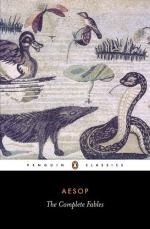THE FARMER AND HIS DOGS
A Farmer was snowed up in his farmstead by a severe storm, and was unable to go out and procure provisions for himself and his family. So he first killed his sheep and used them for food; then, as the storm still continued, he killed his goats; and, last of all, as the weather showed no signs of improving, he was compelled to kill his oxen and eat them. When his Dogs saw the various animals being killed and eaten in turn, they said to one another, “We had better get out of this or we shall be the next to go!”
THE EAGLE AND THE FOX
An Eagle and a Fox became great friends and determined to live near one another: they thought that the more they saw of each other the better friends they would be. So the Eagle built a nest at the top of a high tree, while the Fox settled in a thicket at the foot of it and produced a litter of cubs. One day the Fox went out foraging for food, and the Eagle, who also wanted food for her young, flew down into the thicket, caught up the Fox’s cubs, and carried them up into the tree for a meal for herself and her family. When the Fox came back, and found out what had happened, she was not so much sorry for the loss of her cubs as furious because she couldn’t get at the Eagle and pay her out for her treachery. So she sat down not far off and cursed her. But it wasn’t long before she had her revenge. Some villagers happened to be sacrificing a goat on a neighbouring altar, and the Eagle flew down and carried off a piece of burning flesh to her nest. There was a strong wind blowing, and the nest caught fire, with the result that her fledglings fell half-roasted to the ground. Then the Fox ran to the spot and devoured them in full sight of the Eagle.
False faith may escape human
punishment, but cannot escape the
divine.
THE BUTCHER AND HIS CUSTOMERS
Two Men were buying meat at a Butcher’s stall in the market-place, and, while the Butcher’s back was turned for a moment, one of them snatched up a joint and hastily thrust it under the other’s cloak, where it could not be seen. When the Butcher turned round, he missed the meat at once, and charged them with having stolen it: but the one who had taken it said he hadn’t got it, and the one who had got it said he hadn’t taken it. The Butcher felt sure they were deceiving him, but he only said, “You may cheat me with your lying, but you can’t cheat the gods, and they won’t let you off so lightly.”
Prevarication often amounts to perjury.




